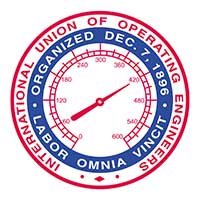Operating Engineers
Job Information

Learn about the Operating Engineers building trade, job information, & how to start your new career.
Operating Engineers Job Overview
Operating Engineers use machinery to move construction materials, earth, petroleum products,
coal, grain, manufactured goods and other heavy materials. Generally, they move materials over
short distances—around a construction site, factory, warehouse, or on, or off trucks and ships.
Operators control equipment by moving levers or foot pedals, operating switches or turning dials. They may also set up and inspect equipment, make adjustments, and perform minor repairs. Operators are classified by the type of equipment they operate: crane and tower operators; excavation and loading machine operators; grader, dozer, and scraper operators; hoist and winch operators; industrial truck and tractor operators.
Must be at least 18 years old; must
have high school diploma or G.E.D. certificate; must be a resident of the jurisdiction of the Local; must have and maintain a valid driver’s license; must show they have a legal right to work in the U.S.; must have physical abilities to perform the duties of the trade; must have adequate verbal, reading/writing skills in the English language to meet demands of the apprenticeship training and must pass a drug screening test using standards established by USDOT.
The apprenticeship program runs for four years with approximately 5,400 hours of on-the-job training. Apprentices must complete 640 classroom hours (160 hours of classroom instruction per year). Apprentices must receive 144 hours of related instruction, hands on and classroom, and they must pass three performance tests.
The apprenticeship program runs for three years. Program includes at least 3,000 hours of on-the-job training, including 600 hours of classroom training.
Industrial technology classes, math and reading, algebra and basic understanding of mechanics
Many operating engineers work outdoors in nearly every type of
climate and weather condition. Some machines are particularly noisy and shake or jolt the operator. These jobs have become much safer with the adoption of overhead guards on forklift trucks and roll bars on construction machinery. As with most machinery, most accidents can be avoided when observing proper operating procedures and safety practices.
Must be able to lift heavy objects and must be able to withstand extreme weather conditions. Must have good math and reading comprehension as well as understand percentages and slopes.
Apprentices start at 60 percent of heavy and highway scale. Salary is:
- $42.05/hr Base Wage, plus
- $10.50/hr Health and Welfare, Plus
- $21.25 /hr Annuity and Pension.
(subject to change)
3 STEPS TO START YOUR NEXT CAREER
Contact Name
Danny Hollenback
Meeting Times
- Last 3 full weeks in September
- Monday - Friday
- 8:00 a.m. - 8:00 p.m.
- $30 fee at time of application
Address
- Operating Engineers Local 649
- 7121 W. Schoolhouse Rd.
- Bartonville, IL 61607
Directions

Construction Jobs
Helping Illinois construction workers
train, grow, & find top paying jobs
